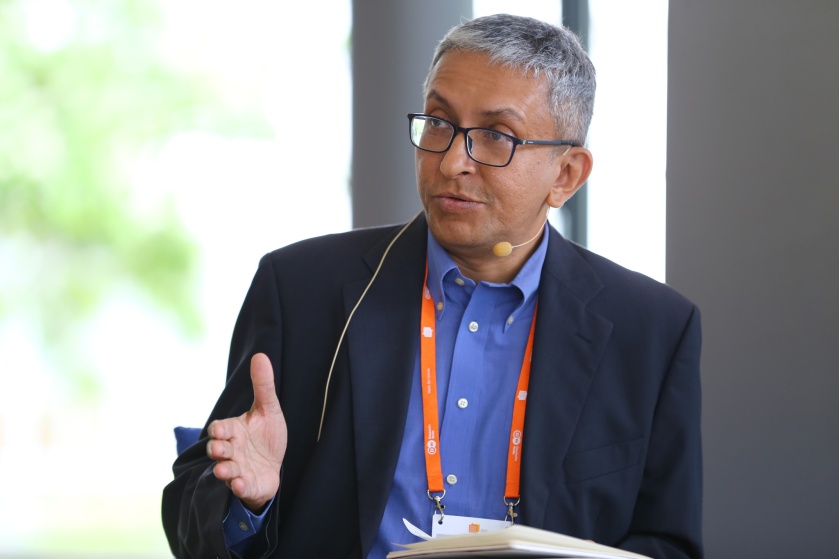
I was a participant and speaker at the 11th Deutsche Welle Global Media Forum (GMF), held in Bonn, Germany, from 11 to 13 June 2018.
Around 2,000 media professionals and experts from over 100 countries gathered at the World Conference Centre Bonn (WCCB) for the event, themed on ‘Global Inequalities’. Across many plenaries and parallel sessions, we discussed a whole range of issues related to politics and human rights, media development and innovative journalism concepts.
On 13 June 2018, I moderated a session on “Digitalization and polarization of the media: How to overcome growing inequalities and a divided public” which was organised by the Institut für Auslandsbeziehungen (ifa) or Institute for Foreign Relations, a century old entity located in Stuttgart.
My accomplished panellists were:
- Christian Humborg, Permanent Deputy to the Executive Director at Wikimedia Deutschland
- Jillian York, Director for International Freedom of Expression at the Electronic Frontier Foundation,
- Curd Knüpfer, Co-Head Research Group on Digitalization and the Transnational Public Sphere, Weizenbaum Institute for the Networked Society, Freie Universität Berlin

Our topic resonates deeply with my personal experiences. I come from Sri Lanka, where a brutal civil war lasted for 26 years and ended nearly a decade ago. But even today, my society remains highly polarised along ethnic, religious and political lines. This is very worrying, especially as we are a multicultural society.
Our media, for the most part, reflect this division in society — and many sections of the media actually keep dividing us even further! Reconciliation is the last thing some of our tribal media owners and editors seem to want…
This situation is by no means unique to Sri Lanka. Well into the 21st century’s second decade, tribalistic media seems to be proliferating both in analog and digital realms! We can find examples from the East and the West, and from the global North and the South.
But let’s be clear: these trends predate the digitalisation of (what is still called) mainstream media and the emergence of entirely digital media. Trends like ultra-nationalistic media, hate speech and fake news have all been around for decades — certainly well before the web emerged in the 1990s.
What digital tools and the web have done is to ‘turbo-charge’ these trends. The ease with which content can now be created and the speed at which it can be globally shared is unprecedented. As is the intensity of misuse of social media platforms, and the spreading of deliberate falsehoods, or disinformation. Conspiracy theorists, spin doctors and other assorted charlatans never had it so good!
What is all this doing to our politics and societies, especially in democracies?
In today’s discussion, we will consider both the established media – television, radio and newspapers – as well as the newer media that are digitally produced and distributed online. (Demarcations are blurred because many ‘old media’ content is also now digitally available.)

- How are old media and new media so much better at polarising societies than in uniting or unifying societies? Do they tape into a fundamental tribal instinct among us?
- Is the free and open internet, especially in the form of social media, undermining free and open societies?
- Around the world, digital media have been a powerful force for the good, promoting human rights, democracy and social empowerment. But is that era of idealism coming to an end? What next?
- How is the role of news journalism changing in an age of foreign policy making that is increasingly impulsive and driven by social media?
- What policies, regulations and actions are needed to avoid undesirable outcomes and to harness all media for the public good?
We may not find all the answers today, but it is very important that we ask these questions and collectively search for answers.

Populism and nationalism are on the rise in many democracies. Recent elections, especially Trump’s victory in the US, are proof of deep social cleavages and the polarization of the media. The media system itself seems to be both the problem and the solution. It reveals the inequality of access to media, to a range of opinions, and to a true exchange that takes place outside of everyone’s echo chamber, and it highlights unequal levels of media literacy.
How can the media itself contribute to overcoming this polarization and disrupt these echo chambers? What does this fragmentation mean for political debates in democracies? How is the role of news journalism changing in an age of foreign policy making that is increasingly impulsive and driven by social media? How important is net neutrality? And what media policies are needed?
